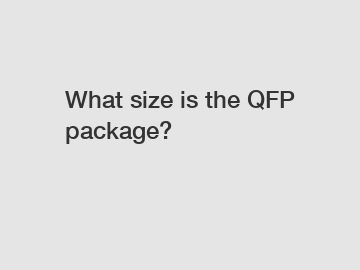What size is the QFP package?
You may have come across the term QFP package while researching integrated circuits or electronic components. But what exactly does QFP stand for and what size is the QFP package? Let's delve into the world of QFP packages to understand their size and significance in the realm of electronic engineering.
QFP stands for Quad Flat Package, which is a type of surface-mount integrated circuit package. The term "quad" refers to the four sides of the package, while "flat" indicates that the leads (or pins) are flat instead of round. QFP packages are popular in the electronics industry due to their compact size, high pin density, and ease of assembly.
When it comes to the size of QFP packages, they can vary depending on the specific design and configuration of the integrated circuit. Typically, QFP packages range in size from as small as 3mm x 3mm to as large as 20mm x 20mm. The number of leads in a QFP package can also vary, with the smallest packages containing around 20 leads and the largest ones having up to 256 leads or more.

The size of a QFP package is an important consideration when designing electronic circuits, as it determines the footprint of the integrated circuit on the printed circuit board (PCB). A smaller package size allows for more compact and space-efficient designs, which is particularly advantageous in applications where size and weight constraints are critical.
In addition to their size, QFP packages offer several other benefits that make them a popular choice for electronic engineers. One of the key advantages of QFP packages is their high pin density, which allows for a greater number of leads in a smaller area compared to through-hole packages. This makes QFP packages ideal for integrated circuits with a large number of I/O pins or interfaces.
Furthermore, QFP packages are easier to assemble and solder than through-hole packages, as they can be mounted directly onto the surface of the PCB using automated pick-and-place machines. This reduces the time and cost of manufacturing electronic devices, making QFP packages a cost-effective solution for high-volume production.
When it comes to selecting a QFP package for a specific application, engineers must consider a variety of factors, including the number of leads required, the size constraints of the PCB, and the thermal considerations of the integrated circuit. It's important to choose a QFP package that meets the technical requirements of the design while also taking into account manufacturing and assembly considerations.
In addition to traditional QFP packages, there are also variations such as TQFP (Thin Quad Flat Package) and LQFP (Low-profile Quad Flat Package) that offer different sizes and configurations to suit specific applications. TQFP packages are thinner than standard QFP packages, while LQFP packages have a lower profile to reduce the overall height of the integrated circuit on the PCB.
In conclusion, the size of a QFP package can vary depending on the specific design and configuration of the integrated circuit, ranging from as small as 3mm x 3mm to as large as 20mm x 20mm. QFP packages offer several advantages, including high pin density, ease of assembly, and cost-effectiveness, making them a popular choice for electronic engineers. By carefully considering the size and configuration of a QFP package, engineers can design compact, efficient, and reliable electronic circuits for a wide range of applications.
The company is the world’s best Reject Conveyors, Smt Pcb Conveyor Manufacturers, Smart Gate Conveyor Price supplier. We are your one-stop shop for all needs. Our staff are highly-specialized and will help you find the product you need.
269
0
0


Comments
All Comments (0)